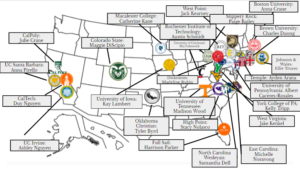The Cases For and Against Standardized Tests at FCHS
May 30, 2018
While the testing of students on a national level is not a recent occurrence, the SAT and ACT have been around since 1926 and 1959, respectively. State-by-state testing has been around for over a century, but the modern idea of mandatory, yearly state testing is really a by-product of the Bush Administration’s 2001 “No Child Left Behind Act.” The bill was technically a reauthorization of the “Elementary and Secondary Education Act,” but it federalized the mandate to test students across the nation on an annual basis. But are these tests truly beneficial to the education system? The Jagwire examines both sides of the debate.
By Joseph Kratz
Managing Editor
Any student knows the dread and apprehension closely tied to the very notion of finals and standardized tests. The expensive books, lengthy test-prep programs, number 2 pencils, and hundreds of Scantron answer sheets. The lengthy, scripted proctor speeches, the apprehensive, drawn-out days before you are informed of your score. These archetypal characteristics make year-end standardized tests one of the most-hated aspects of American secondary education. There have been movements recently to abolish and move past testing as a measure of achievement and growth, but do these tests serve a purpose?
The largest positive impact of the growth of annual tests is an enormous increase in the availability of up-to-date statistics that has served a vital role in the identification and attempted reversal of large, academic issues that plague the students of the United States. The completely standardized nature of the assessments allow for an objective, region-wide data set on which states, counties, school districts, individual schools, and administrators can make policy decisions about the appropriation of resources. That same data also allows individual teachers to measure and gauge students’ growth and achievement throughout the year.
With that being said, it would be naive to pretend that large-scale standardized tests are perfect meters of every student’s performance. Many students have issues focusing in the high-stress environments surrounding these high-stakes tests. Many other students learn and process information that these tests are not designed to cater towards. Testing also solves none of the issues that they seem to identify. Testing students into oblivion has not raised literacy rates, nor has it increased our mathematical aptitude. For that reason, it is important that we examine the role that standardized testing plays in our society.
Regardless of the negatives, drawbacks, and impediments imposed by the extreme predominance of computerized, standardized testing, there are important roles that the testing plays. A clear, comprehensive reformation of the process by which American students are assessed and taught is vital to the continued growth of our educational system.
I am not a disciple of the Standards of Learning, I am not a convert of the SAT, and I am not an acolyte of eCart, but standardized assessments will remain an important yet controversial cornerstone of American education for many years to come. Because of the ingrained use of its data, or possibly due merely to its historical correlation to elementary, middle, and high school life, the flaws of testing do not eclipse the necessity of the data and information it provides.
By Adam Bihi
News & Opinion Editor
Standardized testing is part of what’s wrong with this country today. We focus on these pointless tests that unfairly assess students based on what they’ve learned, rather than actually focusing on the curriculum and encouraging children to explore beyond the depths of learning. For what reason does society get the opportunity to decide instruction? For what reason, not the person? What happens when a kid doesn’t wind up being capable of what society deems essential?
Since the introduction of the No Child Left Behind Act, signed by George W. Bush in January 2002, government-sanctioned testing has been a significant part of the school culture in the U.S. Teachers are pressured to teach nothing but the test, which is time that should be spent teaching students important lessons, and students’ social and emotional development is secondary to the all-important test, which will stress them out to the point where they will attempt to cheat on it. And it’s no surprise that they do because the standardized tests tell us a lot about an applicant’s likely academic performance and eventual career success. Saying as much has become controversial in recent years, as standardized tests of every sort have come under attack. But our own research and that of others in the field show conclusively that a few hours of assessment do yield useful information for admissions decisions.
In order to succeed in these high-stakes tests, many students require prep courses and practice tests. Why is it like this, as opposed to an instinctive arrangement of inquiries? Making a strange, precarious, unreasonable test only serves to enrich these companies and individuals who provide test preparation. Shockingly, the cost of a mentor or tutor for these tests can be over $1000. That is a great deal of cash for a middle class family, and it could be an unimaginable amount for lower-income students and families. Even if you are studying alone, the books you can purchase for independent study are $200. On Amazon, they’re available for around $100 as second-hand editions. That is as yet an obstruction for a few people, particularly the individuals who are as of now rationing to pay the test charge. In the event that you don’t hone your skills enough, whatever you have spent is completely squandered.
Overall, standardized testing beats the imagination and love for learning out of kids. Children are instructed to finish tests, not think fundamentally. A perfect alternative would be for students to have a final project that will require them to use everything that they’ve learned and apply it to show how they’ve mastered it. Students stay up throughout the night to remain awake cramming data they were given all through the semester, just to forget the majority of it after the exam. Final projects are more likely not to be done in one night. Projects require some time and effort, which means students are working with the information longer and will more likely probably remember it. Projects like this are much more beneficial than standardized tests because they indicate the amount of effort you’ve put in and truly encompass what you learned throughout the year.

its expedited grading speed.
(Photo by Joseph Kratz)




